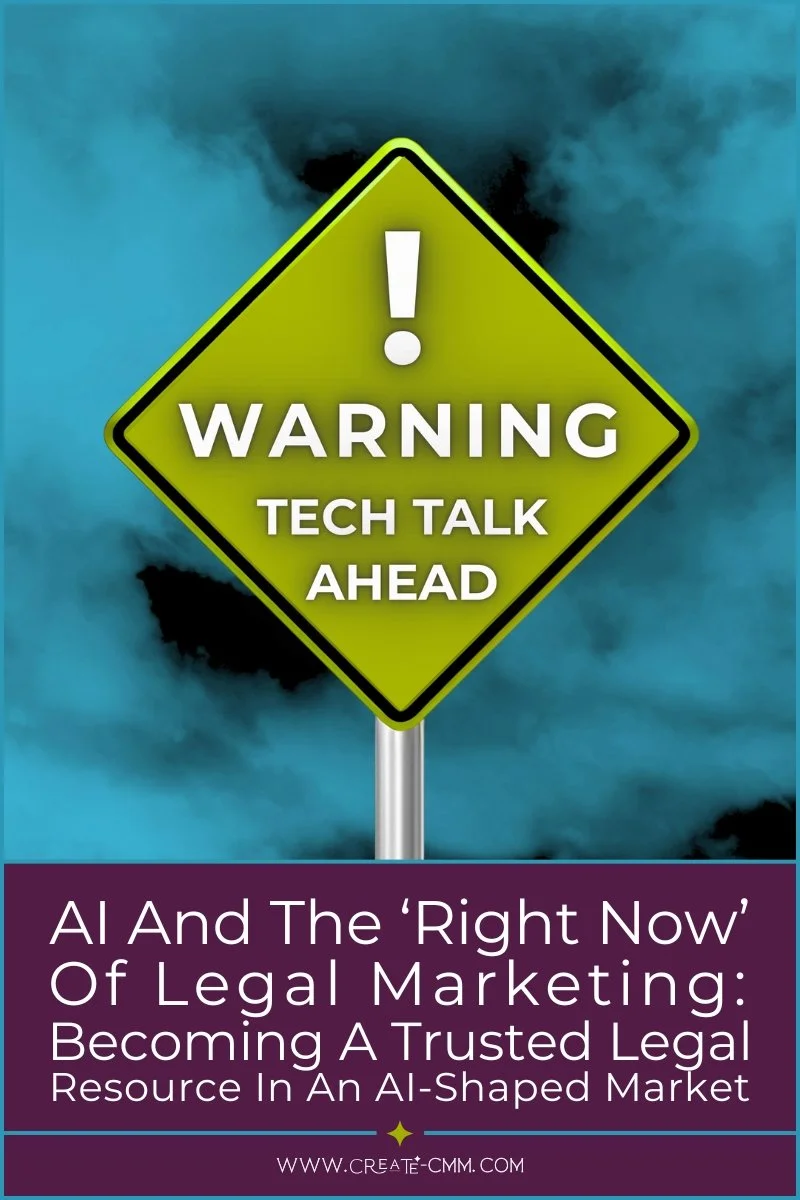AI And The ‘Right Now’ Of Legal Marketing: Becoming A Trusted Legal Resource In An AI-Shaped Market
A version of this article was originally published in The Legal Intelligencer here on August 29th, 2025
If you spend any time on LinkedIn these days (and if you don’t, you should be!), you can’t escape posts, comments, discussions and near-violent throwdowns about AI and its impact on, well, everything.
AI is such a well-known term at this point that we don’t even bother to spell it out on first reference anymore.
Where once AI was a futuristic concept — something akin to Hal in “2001: A Space Odyssey” — it’s now part of our everyday personal and business lives.
Most of us have used, or at least know about, Generative or GenAI — ChatGPT, Claude and DALL-E, for example. This year’s Super Bowl LIX advertising lineup featured a Salesforce ad with Matthew McConaughey showcasing agentic AI — superpowered chatbots or smart assistants with autonomous decision-making and task execution capabilities.
AI-enabled search, whether in stand-alone platforms like ChatGPT and Perplexity or integrated into our existing favorites like Google and Bing, is rapidly replacing traditional search as the preferred starting point for both consumers and B2B buyers.
So, despite all the sound and fury on LinkedIn, the question isn’t if AI will impact the “future” of legal marketing. AI is part of the right now.
The better question is how lawyers and firms can adapt, adopt and set themselves apart in a market where AI is already reshaping how clients research, find and hire legal service providers.
Warning: tech talk ahead.
My lawyer-readers, if you had the urge to duck and run when you read AI, I get it. Stick with me, though. There’s (good) news you can use coming. My legal marketing readers, I know tech is not my usual focus, but AI is here so let’s figure it out together.
AI and search
In a very short time, AI has fundamentally changed the way that people search for and consume content.
Historically, search engines have overwhelmingly been the starting point for people to access information on the internet. In 2024, 70% of people started their internet research with search. Across industries and market sectors, Google (with the lion’s share of the market), Bing and other search engines act as the gateway by providing search engine results pages (SERPs) with links to websites that (more or less) offer answers to searchers’ queries. In fact, search engines drove nearly 70% of web traffic in 2024. The behavior holds for buyers of B2B services; an estimated 70%-80% start their vendor research with a search engine query.
Searchers want answers fast; a Google search session lasts less than one minute on average, and 75% of users look only at the first page of the search results.
For law firms serving both individual and B2B clients, search engine optimization (SEO) has been an essential part of digital marketing strategy. At its most basic, SEO uses website tools like keywords, tags and backlinks; content best practices; and paid search engine marketing (SEM) to drive traffic to firm websites.
But AI has upended — and will continue to transform — search patterns. AI appeals to people’s desire for a quick, definitive answer delivered not as the result of repeated keyword-focused searches, but through conversational search and response.
At the moment, AI-enabled technology factors into internet search in a couple of ways.
First, search engines like Google and Bing are adding AI-generated summaries at the top of their search results — on the first page, before any links to sites. Searchers don’t have to click through links and sift through content to find at least top-line answers to their questions.
Second, people are increasingly turning to AI platforms, rather than search engines, as the starting point for their internet research.
If you’re not reading this sitting down, please sit down now.
Research by business intelligence and advisory firm Gartner predicts that within two years, 95% of B2B buyers’ journeys will start in an AI platform (like Perplexity or ChatGPT) rather than a search engine. According to research firm Forrester, B2B buyers are adopting AI-enabled search at three times the rate of consumers.
The so-called zero-click search era (I’m certain AI created that term), where buyers get answers from AI-generated content without the need to visit a website, is already having a measurable impact. Forbes and other business media are reporting that AI summaries like Google’s are causing a 15%-64% decline in organic website traffic, depending on industry. That’s a wide range, and legal industry stats are all over the place. But firms are reporting declines in website traffic of 15%-25%.
AI and the great content flood
AI is accelerating another marketing challenge for law firms.
GenAI enables lawyers and firms to generate more content, more quickly, often at a lower cost.
Clients are drowning in a sea of content being pushed out over every available channel: blogs, client alerts and newsletters, thought leadership pieces, LinkedIn articles, posts and comments.
Getting the attention of clients in this flood of endless (and increasingly generic) content is a challenge.
It’s also an opportunity, and one that a lot of lawyers and firms are missing.
Especially in a time of legal and economic chaos, clients want and need their lawyers to be more than reactive providers of legal advice. In its most recent client satisfaction research, legal market intelligence and consulting firm BTI Consulting Group found that corporate counsel wants their lawyers and firms to be proactive, delivering insight and actionable advice before being asked. They want unprompted communications about issues and developments, deep and nuanced industry insight, creative solutions, and agile problem-solving around expected and unexpected developments.
According to a survey of 100 general counsel by marketing technology company Passle, the majority of GCs spend five hours a week and often much more trying to stay up to date with business, legal and industry developments. Every GC surveyed — 100% — believed lawyers and law firms have a responsibility to keep clients advised of developments, and the majority cited demonstrating subject-matter expertise as an important factor in their hiring decisions.
Yet, just 8% of the survey respondents thought that law firms were meeting the market’s need for timely, relevant content.
So, what now?
In addition to SEO, law firms now need to think about how AI-enabled tools digest and serve their content to searchers.
Welcome to AI engine optimization: AIEO (which sounds like a song about farm animals). Some people are also using the term large language model optimization (LLMEO/LLMO, which sound like text slang) because AI platforms like ChatGPT and Perplexity are powered by LLMs.
Like SEO, AIEO is a bit of a black box. We don’t know exactly how the algorithms work, but we do have some clues — and some good news.
What clients and prospects want from law firm content is also what AI-enabled search tools look for in the sources they use to generate their answers.
In Passle’s report, respondents listed the following as the important (or very important) characteristics for law firm content:
Authoritative (produced by credible legal experts and includes research and sources)
Relevant to the client’s needs
Timely
Detailed, clear and to the point
Actionable (includes advice and recommendations)
AI-enabled search is also looking for authoritative material from credible sources that answers real, relevant questions. Content that provides facts and data, expert analysis, and insight signals authority and credibility to AI. Unique perspectives and in-depth, nuanced coverage of specific topics are more likely to get quoted and incorporated into an AI-generated answer than surface-level, generic content.
Unlike traditional search engines, AI isn’t looking for keywords. Instead, it’s looking for clarity, organizational structure and natural language patterns like conversational variations for similar concepts. Jargon is out; legal, industry and business terms should be explained in plain language. Content that focuses on providing answers to client questions — and anticipates follow-up questions — rather than on imparting information increases the likelihood of being quoted more than once in the same or successive AI queries.
Fresh content that is consistently delivered also establishes authority and credibility, but quality is much more important than quantity for AI search.
In essence, the content that your clients and prospects are looking for will also help make you findable and visible through AI-enabled search.
Website traffic isn’t the goal; client engagement is
While the rise of AI-enabled search is certainly a challenge lawyers and firms need to meet, it’s important to remember that it only impacts inbound marketing — the way that clients and prospects find their way to websites. It doesn’t impact outbound marketing like email alerts and newsletters, social media like LinkedIn, or direct business development efforts. Lawyers and law firms should use all the channels available to them to reach and engage with their audiences rather than focusing solely on SEO, AIEO and website traffic.
At the end of the day, clients hire lawyers and firms they perceive as trusted resources and partners. AI is just one of the tools clients use to find those lawyers.
Featured Articles





